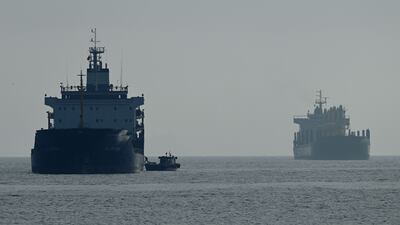A UK insurer has paused writing cover for new shipments through the Ukrainian grains corridor in the Black Sea.
Ascot took the action after Moscow pulled out of the UN-backed agreement to guarantee Ukrainian exports along the route following a drone attack on its Black Sea fleet at the weekend.
Moscow said it was leaving the grain deal for an “undetermined period”.
“From today we are pausing on quoting new shipments until we better understand the situation,” Ascot head of cargo Chris McGill said on Monday. “Insurance that has already been issued still stands.”
Lloyd’s of London insurer Ascot and broker Marsh launched a facility for grain traders in July to provide up to $50 million in cargo cover for every voyage.
The cargo facility, whose underwriting risk has been shared by a number of syndicates in the Lloyd's market, has been used by a significant proportion of the shipments so far.
“Any shipments that were quoted last week are valid for seven days. However, we had seen a drop-off in submissions last week,” Mr McGill said.
“It's new shipments coming to the market since the news that will need consideration.”
Marcus Baker, global head of marine and cargo with Marsh, said the change in the risk environment since the announcement was “very significant”.
“Given the change in circumstances it is not surprising that underwriters have taken the decision to suspend the facility until there is greater clarity,” Mr Baker said.
Russia’s action has the potential to inflate the cost of grain as Ukraine is one of the world’s largest exporters of the product.
Exports under the initiative — which is aimed at lowering food prices by ensuring the delivery of Ukrainian grain to the world — have surpassed 9 million tonnes since it was implemented in July, according to the UN.

Shipments have continued, despite Russia’s announcement, prompting a war of words between those who back the deal and Moscow.
Ukraine confirmed 12 ships had set sail on Monday.
The 354,500 tonnes of grain they carried was the most in a day since the programme began, suggesting a backlog was being cleared after exports were interrupted on Sunday.
“It is hoped that the pledge not to attack commercial shipping will continue to stand,” another insurance market source said.
“Insurers tell us their premiums may leap by a quarter or a half for shipping crossing the Black Sea,” UN aid chief Martin Griffiths told the Security Council on Monday.
The European Union and others have called on Russia to resume the implementation of the pact.
Turkey, which helped broker the initiative, has said it remains committed to the deal which involves the inspection of cargoes at a joint co-ordination centre in Istanbul.
“Even if Russia behaves hesitantly because it didn't receive the same benefits, we will continue decisively our efforts to serve humanity,” President Recep Tayyip Erdogan said.
But Russia said that it would be risky for Ukraine to continue exporting on the Black Sea.
“In conditions when Russia is talking about the impossibility of guaranteeing the safety of shipping in these areas, such a deal is hardly feasible, and it takes on a different character — much more risky, dangerous and unguaranteed,” Kremlin spokesman Dmitry Peskov told reporters.
Chicago wheat futures slid on Tuesday, with the market falling from previous session's highest level in two weeks, as grain shipments from Ukraine continued.
The most active wheat contract on the Chicago Board of Trade was down 0.6 per cent at $8.77 a bushel, as of 3.38am UK-time.
Ukrainian President Volodymyr Zelenskyy said his country would continue exporting grain from its Black Sea ports because the shipments offered stability to world food markets.


